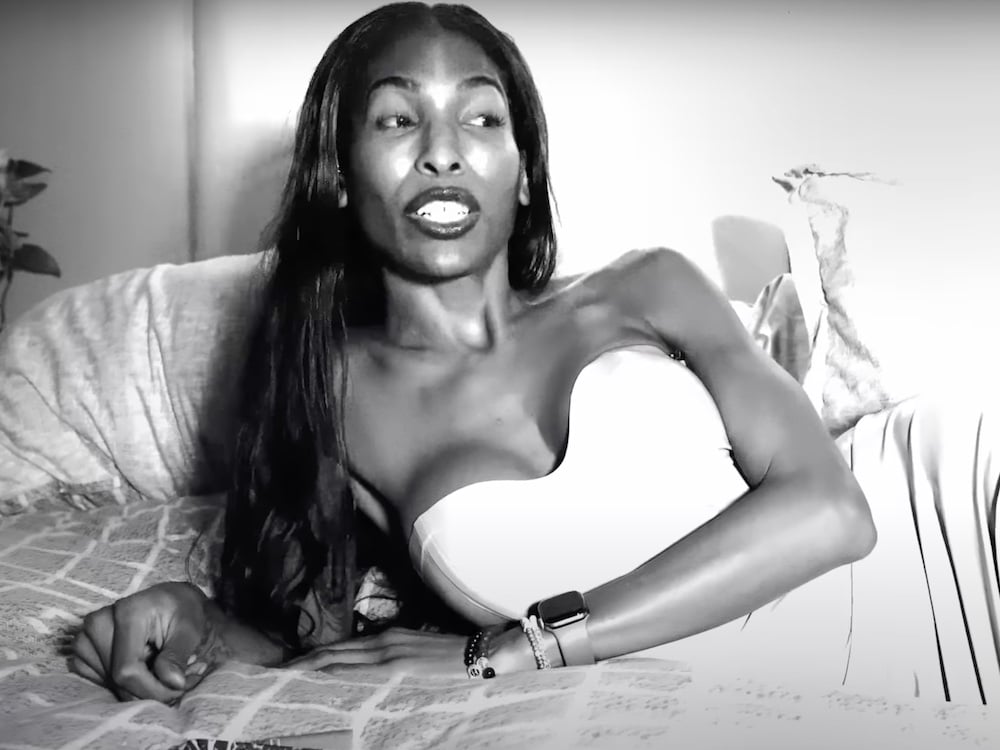For all its style and grit, there’s something missing in Kokomo City, director D. Smith’s documentary portrait of four Black transgender sex workers in Atlanta and New York City.
On the face of it, the film is forthright about what it means to make money as a transgender person in the sex industry. The film’s opening anecdote about a date gone wrong could not be more raw.
After agreeing to meet with a man for sex, Liyah Mitchell noticed that her client had a Glock semi-automatic pistol lying on the bed beside him. Instead of performing oral sex, Mitchell grabbed the gun and something of a donnybrook ensued. The story does not end how you think it might.
If Kokomo City had maintained this level of candour, humour and wild narrative swerves, you would have something truly incendiary. And to be fair, there are a number of moments contained in its brief run time that are riveting. While deeper explorations of poverty, race, sexuality and the tarnished stuff of the American dream are sketched out, the film often prioritizes style over more complex issues.
Director Smith had a successful career creating music videos for a number of musicians including Andre 3000 and Lil Wayne before undergoing her own gender transition in 2016. After losing high-profile clients in the process, she needed another career and shifted to documentary film. Kokomo City has done well, picking up numerous awards on the festival circuit and garnering a distribution deal with Magnolia Pictures.
In addition to Mitchell, the rest of the cast — Daniella Carter, Koko Da Doll and Dominique Silver — are equally plainspoken and blunt about the dangers of sex work. Koko Da Doll was killed after the film wrapped production. As the women talk about their lives and the reality of being triply marginalized as transgender, Black and engaged in sex work, some biographical details are offered. But more often, the film feels performative in a way that denies deeper access.
There are a great many scenes dedicated to each of the individual women looking as beautiful as possible, whether they’re smoking languidly in bed while wearing a silken peignoir or doing jumping jacks in a sporty little outfit. These scenes aren’t themselves problematic, but they have a tendency to distract. You end up simply watching what the women want you to see. Beauty and its many charms is fascinating stuff. But it’s only afterwards that a certain hollowness emerges.
Not that there isn’t vulnerability on display. It’s glazed over, like Vaseline on the lens, by the camera’s fixation on the bodies of these women. The deep focus on physicality and sexuality is so overwhelming that subtler things fall away.
Whether she is tapping her long acrylic nails or stroking her ponytail, Mitchell has all of the accoutrements of conventional feminine beauty: perky breasts, a tight butt and a pretty face. She is clear about the work involved in maintaining this level of attractiveness, be it getting a close shave or more invasive procedures.
Dominique Silver got into sex work while working at a restaurant in New York City when she was 19. As she explains, the other women who worked there were making good money but not “plastic surgery kind of money,” the kind that affords expensive breast implants and nose jobs. When she pressed her colleagues about it, she was told, “We’re WORKING.” Emphasis on the work part.
The twin flames of shame and desire
A gentle note: conversations about sex in the film are decidedly frank. While some men are attracted to trans women because they have both breasts and a penis, others want nothing to do with the male organ. As Mitchell states, many of the men she has had sex with are the last people one might expect to be attracted to trans women. Koko Da Doll is even more forthright, explaining that she is a top and the men she sleeps with want to be penetrated anally. That shouldn’t come as a surprise, but sexual conservatism in the Black community is so entrenched that these encounters are still deeply secretive.
To its credit, the film takes pains to interview a number of Black men who are attracted to trans women. Although many of the clients partake of sexual pleasure with trans women in private, they’re quick to castigate them in public. A rare exception to this is Lenox Love, a promoter who started a nightclub event aimed at trans women and the men who love them. As Love explains in the film, the atmosphere of Hush Night was designed to be less of a drag event and more of “a stripper atmosphere.” As Love says, “I do like trans women. I like all women.” Or as Koko says, “there’s no judgement.”
Hush Night looks very much like a conventional strip joint, and as Koko Da Doll states, the event attracts men with money and power, from star athletes and rappers to more aggressive types. In fashioning an event that largely resembles and perpetuates heterosexual conventions, somehow the stigma of queer sexuality is sidelined. In this aspect, the trans women don’t appear to be much different from other sex workers in the transactional nature of the relationships they have with their clients.
Violence is another of the ongoing subjects in the film. As Silver explains, it’s usually post-orgasm that brutality happens, often in direct reaction to the idea of pleasure. After performing oral sex on a man who purportedly didn’t realize she was trans, she was beaten severely. As she says, “Violence doesn’t happen before the orgasm. They act out because they feel like their masculinity is threatened.” Mitchell is even more direct, stating matter-of-factly that trans sex workers either leave the profession or end up dead.
Mourning Black men
It’s Daniella Carter who delivers some of the most incandescently passionate speeches from the depths of her bathtub, holding forth on what it means to always be beholden to the control and the privilege of men. As she says: “The Black experience has always been limited to the way in which a white person told us we could live. And we threaten that as Black trans people, because what we’re saying to Black people who have been conditioned in that mindset that our Black men should be this way and Black women should that way — we’re saying fuck all that.”
It is this aspect of the film, the idea that conventional masculinity is a means of power, protection and safety in the Black community, that advances one of the most fascinating conversations in the documentary.
Daniella Carter describes her mother’s deep grief when she transitioned to being a Black woman. As she explains, her mother was forced to contend with the fact that in becoming a woman herself, her former son could no longer protect her, but was in fact as vulnerable as she was, if not more so. She was grieving the loss of another Black man in a community where casualties for men of colour are multiple and ongoing, whether through violence, incarceration or addiction.
The stories told by the women in the film are fascinating. And the documentary has style to burn, from the crisp clarity of its black and white cinematography to the jazzy soundtrack that moves fluidly from Kokomo Arnold’s Sissy Man Blues, to the Crusaders’ disco hit “Street Life.” In hotel rooms, cars, restaurants and boudoirs, the interviews in the film have a casual ease to them, as the women talk about their work, romantic lives, friendships and the rituals of beauty.
So, is it greedy to somehow want more? Smith has been clear in early interviews that she made the film for a primarily Black audience and wanted to offer the women interviewed the chance to speak the truth of their experience. Kokomo City does this. Isn’t this radical enough?
I suppose I was waiting for the leap to be made from the realities of Black trans women’s lives to others’ experience as well, and to find some greater form of solidarity and perhaps the possibility of action and change. But instead, the focus is on the individual, the personal, even as they’re talking about the bigger forces that keep people of all genders trapped.
Kokomo City is screening at VIFF’s Vancity Cinema in Vancouver until Aug. 5. ![]()
Read more: Rights + Justice, Gender + Sexuality, Film

















Tyee Commenting Guidelines
Comments that violate guidelines risk being deleted, and violations may result in a temporary or permanent user ban. Maintain the spirit of good conversation to stay in the discussion and be patient with moderators. Comments are reviewed regularly but not in real time.
Do:
Do not: